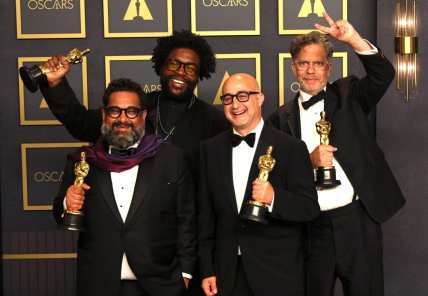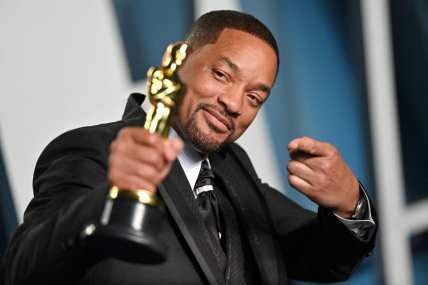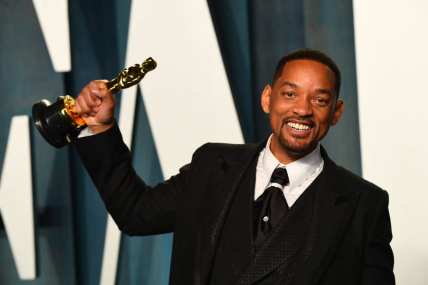Sometimes, people get smacked
OPINION: Some things don’t deserve hot takes, social media analysis or self-righteous virtue signaling. The Chris Rock-Will Smith Oscarmania match is just a thing that happened.
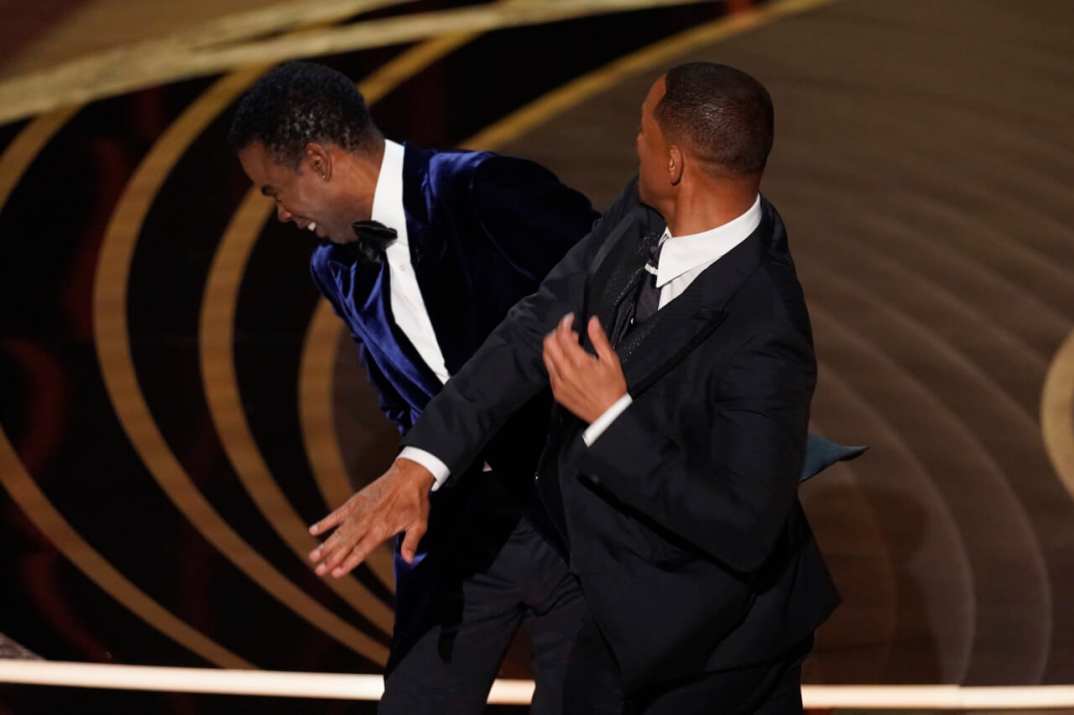
Editor’s note: The following article is an op-ed, and the views expressed are the author’s own. Read more opinions on theGrio.
Last week, my friend Sammie was remodeling my home when he interrupted his coworkers’ work to tell them the origin story of our three-decades-long friendship.
It began when our teacher called Sammie’s full name during the roll call at the beginning of our fifth-grade year. Apparently, I was the only person in class who found his actual first name to be hilarious (Calm down; I’ll reveal it later). Because I felt the need to make friends on my first day in the public school system, I immediately launched an incessant stream of slavery jokes that no one else seemed to find funny. He was not amused by me asking if he knew Harriet Tubman or if he had a twin named “Slave Sammie.”
“I was a bully,” he explained to his coworkers. “But Mike was the only person who ever bullied me.”
It was true; he was a bully. One day, Sammie volunteered to hold the door for everyone during our trip to the cafeteria. As each person entered, Sammie pushed everyone inside with a light kick to the derriere. But when he kicked me, instead of threatening to call the head of the plantation on him, I responded with a smack to his face. It was only then that I understood why his first name, his family history and why our classmates silently tolerated his bullying.
Sammie’s father was one of the most decorated karate instructors in America.
For years, I had recounted the tale of the 11-year-old black belt who could break two-by-fours with his bare hands. After he literally kicked my ass, he did it again. Until last week, I had totally forgotten the story of our fight because we settled our beef in the most ancient way possible and never held a grudge about it. When the construction crew heard this story, they didn’t have follow-up questions. They didn’t debate which one of us was the actual bully. They didn’t examine the nature of violence or even ask Sammie about his real first name. They mostly talked about sheetrock.
This is a think piece about all the think pieces about the Will Smith-Chris Rock brouhaha.
By now, I’m sure there are a million opinion articles about the Oscars’ impromptu slapping exhibition on Sunday. According to social media, the mixed martial arts fight between Will Smith and Chris Rock is either about Will Smith being a thug or about defending Black women. Or maybe it is about how the beef between Chris Rock and the Fresh Prince’s royal family started years ago. It might also be about the concept of free speech. Or maybe it’s about how violence is not the answer. But my “hot take” is much simpler:
Sometimes people get smacked.
That’s it. That’s all.
Even if Rock’s joke about a woman suffering from alopecia was out of bounds, I do not believe that smacking Chris Rock in any way “defended” Jada. I also do not think this was a case of “toxic masculinity.” As someone who was raised in a household of Black women who silently absorbed the emotional violence America inflicts upon them on a daily basis—who was also raised in a culture where fisticuffs is a reasonable way to settle disputes—I cannot pretend to be shocked by what transpired on the Oscars stage. That joke about Jada’s hair probably stung as much as Smith’s open-palmed face swat. However, the complex combination of competing social norms, individual reactions and righteous indignation cannot be explained in 280 characters or a Facebook post, except to say:
Sometimes people get smacked.
There are millions who understand what happened and there are others who think this was a simple assault. Maybe both sides are right and both sides are wrong. Perhaps neither person involved committed an egregious act. Two things can be simultaneously true. Maybe this lukewarm take on what happened is not even think-piece worthy.
I first considered writing something about my ongoing fascination with how we cherrypick parts of the definition of the word “violent.” We all agree that the “use of physical force” is not OK, conveniently leaving out the part that defines violence as “injury by or as if by distortion, infringement, or profanation.” We talk about the Black-on-Black violence in Chicago but not about the fact that nearly a third of the city’s Black residents live below the poverty line. When we discuss the increase in violence last year, we are talking about crimes defined largely by white legislators, not the people who died because of lack of healthcare, government incompetence and right-wing ignorance. In America, the 31 million people who didn’t have health insurance aren’t victims of violence. The kids in underfunded schools, the people who are killed by police and the ones subjected to a discriminatory criminal justice system are definitely being subjected to an “intense, turbulent or furious and often destructive action or force.” It might be in the dictionary but, in America, this is not considered “violence.”
Because, sometimes, poor people get smacked.
Perhaps I should have written an op-ed about the concept of free speech (not the constitutional amendment, but the concept of saying whatever one wants to say). I recognize the individual right of people to say whatever they want. But freedom of speech doesn’t make one immune from the consequences of their speech. As someone who receives at least one weekly email every week calling me the N-word, I understand that I can’t smack everyone who offends me. However, someone saying those same words to my mother, my wife or my children might catch a different variety of smoke. I know comedy wouldn’t exist if they couldn’t make jokes about the audience. I also know that every comedian has a story about being confronted by an outraged audience member. But since Jada wasn’t at a comedy show, and she had previously asked Rock to leave her alone, there’s no need to even write that piece.
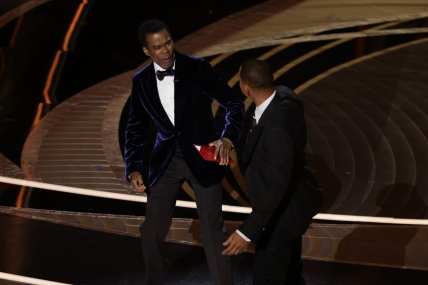
This is not how you protect Black women
Of course, I could have added some levity to the situation by talking about how Will Smith turned the Oscars into the Source Awards. I could have joked about the historic moment when Chris Rock became the first person to publicly agree to keep someone’s name out of their mouth. I could have talked about how this wouldn’t have even turned the music down had this happened at a cookout or a nightclub. I even could have quipped that Will Smith should have saved that smoke for the person who suggested he make the movie Bright. But many people understand that the only thing about this spectacle that is newsworthy was that it happened around white people. Even the people who say “Will Smith wouldn’t have done this to a white man” understand that white people have nooses reserved for the necks of unruly negroes. Smith understands. After all, Will Smith is an alive Black man in America who knows…
Black people always get smacked.
No, this is not about protection or toxic masculinity. This has nothing to do with violent behavior or the Hollywood elite. The same people who voted for convicted child rapist Roman Polanski to win an Oscar for best director after being arrested for drugging and raping a 13-year-old are now calling for Will Smith to be kicked out of the Academy of Motion Picture Arts and Sciences for “disgracing” their “community.”
But this ain’t about that.
What happened on Sunday isn’t even about race. It’s not about violence, social media or movies. It is just a thing that happened between two men who were both kinda wrong and both kinda right. On a day when World War III might be bubbling up during a global pandemic and an economic crisis, a man getting publicly slapped on the face for saying something slick about another man’s wife might be the least newsworthy, most understandable thing that happened inside my television set.
Or, as LaKeith Stanfield explained:
Don’t take the word of your favorite writer, Black Twitter or the great philosopher Socrates Stanfield. What happened on Sunday is no more shocking than sheetrock or a fifth-grade fight because, in places all over the world, real stuff do be happening…
Ask Master Sammie Lee Brunson.
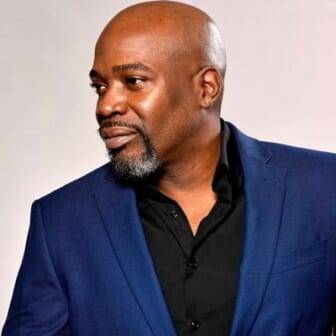
Michael Harriot is a writer, cultural critic and championship-level Spades player. His book, Black AF History: The Unwhitewashed Story of America, will be released in 2022.
TheGrio is FREE on your TV via Apple TV, Amazon Fire, Roku, and Android TV. Please download theGrio mobile apps today!
